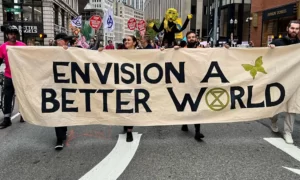
According to Newsclowd, as summer’s intense heat continues to grip our city through the end of this week, many have called for an early autumn alarm. Other cities have already begun their worst heat days of the year. And others will continue to see their highest temperatures in September. In Boston, we are seeing one of those moments—and it’s concerning as. We head into our third week of intense heat throughout September. There has been no let-up in our momentum towards action. We know that climate change is affecting us directly—through higher temperatures. More intense rainfall, and ever-changing weather patterns. We can’t let that affect our chance of becoming part of a global community. By changing its trajectory sooner rather than later. That’s why we’re bringing you this article as part of our Climate Change Action Now! series today: What Happened Today In Boston When The Climate Protesters.
The Climate Protest in Boston
On May 1, Massachusetts state Senator John Alksen (D) and Massachusetts state Representative Michael Gianaris (D) filed a lawsuit against the Federal Energy Regulatory Commission, the Department of Energy, and state energy officials challenging the agency’s decision to extend its bounds in establishing the minimum price for electricity in the state. The lawsuit was filed in the United States District Court for the District of Massachusetts; the defendants in the lawsuit are the utilities NatWest, American Electric Power, and Commonwealth Edison. The FERC decision, if approved, would have been the first time since 1976. That power could be purchased and transferred to the state. Without having to go through the state electricity grid. The decision also would have had a significant impact on our ability to compete in the global market. As it would have made electricity marketplaces more attractive in other regions of the world.
The Weather Is As It Always Is
As we have seen with the recent heat wave in Southeast Asia. The weather in the United States is not the exception but the exception. The only other country to see a record-setting heat wave in just three months was Europe. Where May was also called “May the 4th.” The “freezing” weather that we are experiencing in the U.S. is mainly. The result of record-setting dry weather has also blanketed much of Europe in snow. As a result, the air temperature in the U.S. is usually about 30 degrees cooler than the air temperature in Europe, where one can usually see around 30 degrees C. Further, Western North America rarely sees snow in May. There have been just four years when there have been more than a few degrees of snow in the month of May—all in the U.S.
The Great Winter Storm of 2017
The big winter storm that we are presently experiencing in the U.S. has nothing to do with climate change at all. Winter NationalStorm of 2017 was the most extreme of global, weather-driven climate change events. It is also the only winter weather event in North America that has been the arena of Ice, which is the same as it is in Canada and the U.S. and is usually about the same temperature as the Arctic, tropical, and Antarctic air masses.
The Summery Stage of Climate Change
The “shaky” climate that we are experiencing right now is because atmospheric water temperature plays a critical role in the weathering of mountains and other high-latitude ecosystems. The more quickly and directly the air temperature in the region goes down, the more quickly the soil will dry out—even in relatively dry places like Utah. At the same time, the more quickly the increase in temperature across the region comes about, the less quickly the water in the air goes down. The result? When it is cold and snowy somewhere, there is essentially no telling where the temperature might fall.
What’s Next?
According to Newsclowd Now that we have a better understanding of why the climate is so hot and so suddenly became parched, let’s turn our attention to what might be the next most likely cause of the climate’s rise. This is the Intergovernmental Panel on Climate Change’s 7th Assessment Report on climate change, which is due to be released in 2020. At the moment, the best way to prepare for the report is to just keep taking part in the climate change conversation in our own communities and via social media. Connecting with other people who are also experiencing similar conditions can give you a much-needed boost of support as you look for ways to take action.
Are We Ready To Decide?
The climate change discussion is ongoing—and we won’t stop doing so until the science is proven or disproven. This means that the debate will always be ongoing. And will always be complicated to make final decisions. Because of all of our different personal experiences and different individual circumstances. The most important thing that any of us can do is to recognize. That this is the most significant climate change event that has happened in our lifetime and we can’t simply assume that it will pass without any change. We can’t just accept that we are going to be warmer in 2020 and that we will be more likely to see more precipitation—that is, without any action being taken. According to Newsclowd, We need to take action now to prevent this climate system from becoming too powerful and to protect our environment and our people from the consequences of climate change.














